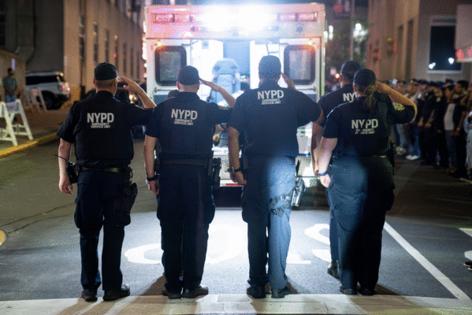Stigma still keeps police from seeking mental health care, study finds
Published in News & Features
Police officers may face hundreds of traumatic incidents over the course of their careers, but many still hesitate to seek mental health support when they need it.
Despite growing investments in wellness programs by law enforcement agencies across the country, a recent study of just over 100 surveyed officers from the Fargo Police Department in North Dakota found that stigma remains a major barrier to mental health care for officers.
The study found that 60% of surveyed officers said most of their peers wouldn’t disclose a mental health condition to a colleague, and nearly three-quarters believed officers wouldn’t tell a supervisor. Slightly more than half agreed that most officers would expect to face discrimination at work if they disclosed they were experiencing mental illness.
Carol Archbold, the study’s author and a criminal justice professor at North Dakota State University, said officers may avoid disclosing mental health struggles because doing so also conflicts with societal expectations that they remain strong and unemotional.
“The nature of [police officers’] work really, really makes it difficult and important for them to have services available and for them to actually utilize them,” Archbold told Stateline, adding that departments also need to foster a culture where officers feel comfortable using the support available to them.
Departments across the country have expanded access to services like counseling, peer support, therapy, substance use programs, and on-site gyms in response to growing concerns about post-traumatic stress disorder or PTSD, depression, and suicide among officers. The Fargo Police Department, for example, hired its first-ever health and wellness coordinator last year.
While the department offers a wide range of mental health-related services and programs, the study found that relatively few officers are using them.
Eighty-four percent of surveyed officers were aware of the department’s new health and wellness coordinator, but only 22 had interacted with them, and 19 found the interaction helpful. About 68% knew about the Employee Assistance Program; 20 had used it, with 17 reporting it was helpful. Awareness of the peer support program was higher at 93%, yet only 42 officers had used it, and 36 said it was helpful.
Still, stigma and fears about career repercussions may discourage some officers from using such services.
About half of all U.S. adults will experience at least one traumatic event in their lifetimes, though most will not develop PTSD, according to the National Institute of Mental Health. For police officers, the rate of exposure is significantly higher. Research suggests police officers may experience about three traumatic events every six months, or roughly 180 over a 30-year career.
Repeated exposure to traumatic events has been linked to a wide range of health issues in first responders, including poor sleep quality, depression, alcohol misuse and a heightened risk of PTSD.
In the Fargo survey, 53% of officers agreed that most police officers view being treated for a mental illness as a sign of personal weakness and would not seek professional help if they were experiencing mental health issues.
Forty percent believed that having a history of mental illness would negatively affect an officer’s chances for promotion. Many officers also disagreed with the idea that mental illness would lead to mistrust or social exclusion among peers. Sixty-four percent of officers disagreed with statements suggesting that most officers would avoid partnering with or think less of a colleague who had experienced a mental illness.
While agencies have expanded mental health resources in recent years, the study’s findings suggest that organizational culture remains a key factor in whether officers feel comfortable using those services.
The U.S. law enforcement system includes more than 17,000 federal, state, county and local agencies. While smaller and rural departments may be less likely to offer robust mental health services, Archbold said that does not reflect a lack of interest from leadership. Many departments — regardless of size — struggle to meet officer wellness needs within existing budgets and often must seek additional funding to support mental health programs.
“It’s likely that police chiefs would like to have these services available, but they just don’t have the money to be able to do that –– to provide those services,” Archbold said.
____
Stateline reporter Amanda Hernández can be reached at ahernandez@stateline.org.
____
©2025 States Newsroom. Visit at stateline.org. Distributed by Tribune Content Agency, LLC.







Comments